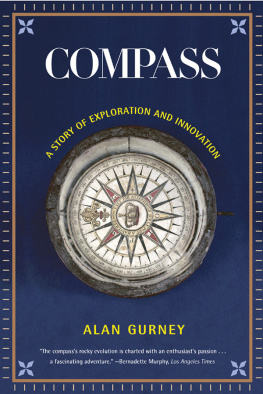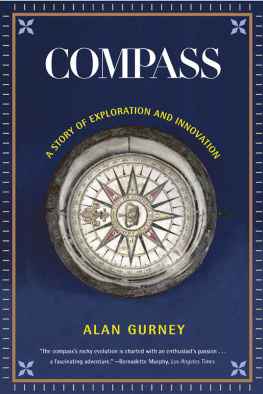

CONTENTS
The genesis for this book sprang from two sources: one, the interest generated when researching my book on sailing exploration in the Antarctic, The Race to the White Continent , and the nineteenth-century concern with terrestrial magnetism; the other, listening, with a certain amount of incredulity, to the story of the high-tech yacht told in this books prologue.
Thus I was led to the sudden realization, having spent many hours being guided by the compass on ocean races and coastal cruising, of my total lack of appreciation and understanding of all the developments which, over the centuries, have brought the magnetic compass to its present state of perfection. Well might John Hamilton have written in 1552 that a skipper can not guide his ship to a good haven without direction of his compass.
Any writer on the magnetic compass and early navigation is in deep debt to two men: Commander W. E. May R.N., founding member of the Royal Institute of Navigation and for many years Deputy Director of the National Maritime Museum; and Lieutenant-Commander D. W. Waters R.N., one-time Keeper and Head of the Department of Navigation at the same museum.
For specific help in gathering together the strands that make up this book I would like to thank the staff of the Public Record Office, Kew; the Hydrographic Office, Taunton; all the unfailingly helpful librarians at the Royal Geographical Society, The Royal Society, the National Maritime Museum, the British Library and, in particular, those at that wonderful institution, the London Library. I would also like to thank Dr. Toby Clark, Lady Joan Heath, Diana Harding, the Royal Yacht Squadrons Archivist, and the compass manufacturers Ritchie Navigation in the United States and Lilley & Gillie in England. And last, but most important, my wife, Carol, for her reading of the manuscript, her helpful suggestions, and her long-suffering patience in listening to my ramblings on the various individuals who figure in the following pages.
COMPASS

The sailors, moreover, as they sail over the sea, when in cloudy weather they can no longer profit by the light, or when the world is wrapped in the darkness of the shades of night, and they are ignorant to what part of the horizon the prow is directed, place the needle over the magnet, which is whirled round in a circle, until, when the motion ceases; the point of it [the needle] looks to the North.
A LEXANDER N ECKHAM , 1187
To the east is the boundless ocean, where the sun and sky blend their colours, and the passing ships sail only by means of the south-pointing needle. This has to be watched closely by day and night, for life or death depend on the slightest fraction of error.
C HAO J U -K UA , 1225
To guide them and help them regain the shore they have but one preservation, a mariners compass, for with this they can see which way to set their course after the winds have risen.
O LAUS M AGNUS , 1555
Who was the first inventor of this instrument miraculous, and embued as it were with life, can hardly be found.
W ILLIAM B ARLOWE , 1597
The compass is the soul of the ship.
V ICTOR H UGO , 1866
Curiously enough, until comparatively recently, shipbuilders and owners did not bestow on the compass the amount of consideration which it undoubtedly merits. It is pre-eminently the instrument upon which the safety of the vessel depends, and justly ranks first in importance. It would be easier to dispense with the chronometer, or even the Sextant, than with this invaluable guide.
C APTAIN S. T. S. L ECKY , 1908
There is no more fascinating subject than the history of mans going down to the sea in ships and then out across it. It is the story of maritime peoples everywhere.
A NDREW S HARP , 1956
 On a sunny spring morning of 1998, a new and very expensive yacht set off on her sailing trials. This was a vessel brimming with the latest in high-tech wizardry and it would have taken a very clever diviner to find the few pounds of natural materials, wood, wool, and cotton, among the tons of petroleum derivative foams, fibers, and resins that had gone into the construction of her hull, deck, accommodation, sails, mast, and rigging.
On a sunny spring morning of 1998, a new and very expensive yacht set off on her sailing trials. This was a vessel brimming with the latest in high-tech wizardry and it would have taken a very clever diviner to find the few pounds of natural materials, wood, wool, and cotton, among the tons of petroleum derivative foams, fibers, and resins that had gone into the construction of her hull, deck, accommodation, sails, mast, and rigging.
The navigation station, with its screens, keyboards, dials, flickering digital numbers, and softly glowing lights, was a monument to defense industries, microchips, orbiting satellites, and James Bond movies. No inconvenient and cumbersome charts, tide tables, parallel rules, plotters, dividers, or pencils cluttered this altar to modernity. The navigator, sitting before an array of screens, could happily tap at the ranks of keyboards to find the yachts position on the chart glowing on one screen, then set the course and punch the command into the self-steering mechanism. On other screens he could note the yachts speed, the winds speed and direction, the state of the tide and depth of water under the keel; study a weather map; monitor approaching craft on the radar.
On deck the human helmsman (when required) steered his course by a fluxgate compass. This compassand its vast array of attendant gadgetrywas powered by electricity from an equally vast array of batteries.
On the first night at sea, a moonless, starless night, cloud-covered and black as pitch, all the electronic gadgetry failed due to a defective switchboard. Screens went blank. Digital read-outs faded. The fluxgate compass, losing its life-giving electrical pulse, metaphorically rolled-up its eyes and died.
The owner had put all his trust into high-tech navigation, forgetting (or perhaps not even being aware) that Bran Ferren, a computer expert, had memorably defined technology as stuff that doesnt work yet. Not even an old-fashioned, hand-bearing magnetic compass disfigured the bulkhead.
The helmsman, as the yacht sliced through the waves in thoroughbred style, suddenly realized that his only sense of direction came from the wind. The reassuring glow from the compass and wind-direction indicators had vanished. Lighthouses and buoys, blinking their signals, were all far below the horizon. No stars or moon glittered in the heavens to act as celestial beacons. His only reference point had been reduced to the wind blowing on his right cheek. With all on board praying that the wind stayed directionally steady, the yacht was put about. With the wind now blowing on the helmsmans left cheek and with an anxious torch shining on a scrap of fabric tied and fluttering on a shroud (a very low-tech wind indicator), the blinkered thoroughbred, under reduced sail, sailed back on what was hoped a reciprocal course. Early that morning the clouds cleared and the Pole Star, with a welcome glitter, showed them north, followed by the sun lifting itself above the eastern horizon. Later that day, with the aid of binoculars and a crew member familiar with the waters, the yacht returned to the marina.
The loss of the compass proved a most traumatic experience. Sailing blind, by wind direction alone, is the stuff of dinghy sailing. Offshore, out of sight of land, on a pitch-black night with no directional guides save the wind, is another experience. An experience that took those twentieth-century yachtsmen back a thousand years. Back into a time when men navigated across the seas before the marine compass had been invented.
Next page









 On a sunny spring morning of 1998, a new and very expensive yacht set off on her sailing trials. This was a vessel brimming with the latest in high-tech wizardry and it would have taken a very clever diviner to find the few pounds of natural materials, wood, wool, and cotton, among the tons of petroleum derivative foams, fibers, and resins that had gone into the construction of her hull, deck, accommodation, sails, mast, and rigging.
On a sunny spring morning of 1998, a new and very expensive yacht set off on her sailing trials. This was a vessel brimming with the latest in high-tech wizardry and it would have taken a very clever diviner to find the few pounds of natural materials, wood, wool, and cotton, among the tons of petroleum derivative foams, fibers, and resins that had gone into the construction of her hull, deck, accommodation, sails, mast, and rigging.